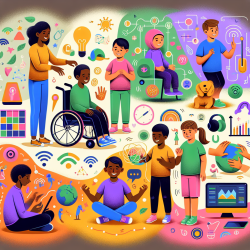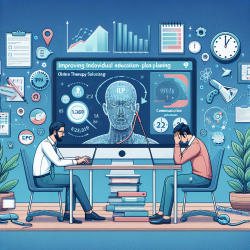Introduction
In the ever-evolving field of speech-language pathology, the integration of technology and data-driven methods is crucial for enhancing therapeutic outcomes. One of the most promising areas of advancement is Clinical Natural Language Processing (NLP). A recent study, "Advancing the State of the Art in Clinical Natural Language Processing through Shared Tasks," sheds light on how shared tasks can drive innovation and improve clinical practices.
What Are Shared Tasks?
Shared tasks are organized scientific challenges that focus on specific problems within a field, in this case, Clinical NLP. These tasks provide a unified framework for researchers and practitioners to evaluate and improve their methods using a common dataset. The study reviewed 17 shared tasks since 2015, highlighting their role in advancing NLP methodologies.
Key Findings from the Study
- Data-Driven Approaches: Most successful methodologies in Clinical NLP are data-driven, leveraging large datasets to train and refine models.
- Named Entity Recognition (NER): This task, which involves identifying and classifying key terms in text, is the most common and successful task in shared challenges.
- Methodological Diversity: While NER tasks show homogeneity in methods, relation extraction and multi-class classification tasks benefit from a diverse range of approaches.
- Data Sensitivity: The availability and sensitivity of data, such as electronic health records, significantly impact the scope and success of shared tasks.
Implications for Practitioners
For practitioners in speech-language pathology, the insights from this study can be transformative. By understanding and implementing data-driven methods, practitioners can enhance their diagnostic and therapeutic processes. Here are some practical steps:
- Adopt Data-Driven Tools: Integrate NLP tools that utilize large datasets to improve the accuracy of assessments and interventions.
- Participate in Shared Tasks: Engage with the research community by participating in shared tasks to stay at the forefront of NLP advancements.
- Focus on NER: Develop skills in Named Entity Recognition to better identify and classify clinical terms, enhancing documentation and analysis.
Encouraging Further Research
The study emphasizes the need for more diverse data sources and larger datasets to continue advancing Clinical NLP. Practitioners can contribute by collaborating with researchers to provide de-identified clinical data, thus expanding the scope of available datasets. Additionally, staying informed about ongoing shared tasks and their outcomes can provide valuable insights into the latest trends and technologies.
Conclusion
Shared tasks in Clinical NLP offer a unique opportunity for practitioners to enhance their skills and improve clinical outcomes. By embracing data-driven methods and participating in collaborative research efforts, speech-language pathologists can significantly impact the field and provide better services to their clients.
To read the original research paper, please follow this link: Advancing the State of the Art in Clinical Natural Language Processing through Shared Tasks.










